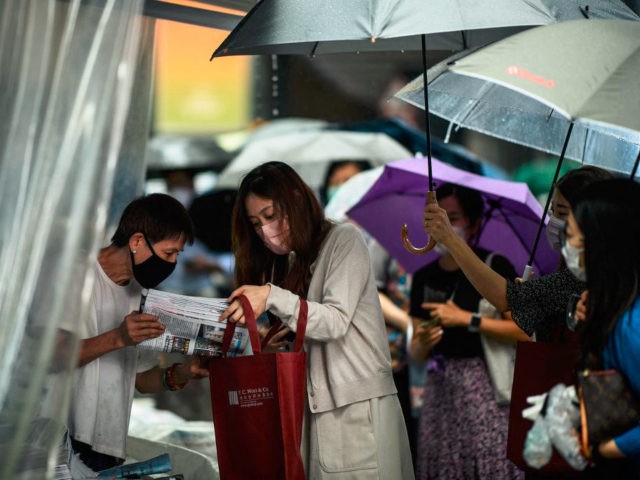Hongkongers ignored inclement weather and began lining up at one o’clock in the morning on Thursday to buy the final edition of Apple Daily, the pro-democracy newspaper crushed by the Chinese Communist Party (CCP) with police raids and asset seizures last week.
The Apple Daily farewell issue reportedly sold out quickly despite an enormous million-copy final print run, prompting resourceful supporters to create a crowdsourced online spreadsheet listing newsstands that still had copies for sale.
I went to five 7/11s & three newsstands in my neighbourhood this morning to try to buy a copy of Apple Daily – everywhere was sold out. People have started an anonymous google sheet updating places in Hong Kong where Apple Daily is still available: https://t.co/jjH7lTX0in pic.twitter.com/TpKzhR5Ql5
— Sue-Lin Wong 黄淑琳 (@suelinwong) June 24, 2021
HKFP_Live: Hongkongers are picking up the final copy of Apple Daily in Mong Kok, where an early batch is hitting news stands. https://t.co/1OwcQ1M4fw pic.twitter.com/qeJ4PurZy5
— Hong Kong Free Press HKFP (@hkfp) June 23, 2021
It’s 1:45am, and there is a very, very long queue for the final edition of Apple Daily at the newsstand in Mongkok.
There will be a million copies printed, but people are still worried they can’t get their hands on one. Goodnight, 🍎. pic.twitter.com/M30tzlSPHA
— K Tse (@ktse852) June 23, 2021
Online supporters backed up Apple Daily articles onto decentralized blockchain platforms that communist officials or Hong Kong’s puppet government could not shut down or censor. Over 4,000 Apple Daily articles had been preserved on the ARWeave blockchain system as of Thursday morning.
ARWeave bills itself as a “collectively owned hard drive that never forgets” — its data is spread across thousands of systems, so no single computer can be seized and no single IP address can be blocked to shut it down. More blockchain data repositories are spinning up to thwart China’s massive censorship apparatus by preserving banned content like Apple Daily.
“Good luck, and goodbye,” the Apple Daily mobile app said as the clock struck midnight on Wednesday and the newspaper’s last few social media accounts began shutting down.
The app pushed out a few last stories to readers, including one about the final issue of the print edition, headlined “Apple Daily’s Epilogue Is Born, A Record-Breaking One Million Copies With a 12-Page ‘Farewell Letter to Hongkongers.’”
The final print edition went to press with a front-page story composed during the final hours of Apple Daily, featuring a photo of supporters gathered outside the office under the headline “Hong Kongers Bid a Painful Farewell in the Rain.” The farewell letter to readers was entitled “Until We Meet Again.”
A few hundred supporters gathered outside Apple Daily’s offices to salute the staff by shouting words of encouragement and waving their mobile phone lights. A few brave souls shouted the slogan of the 2019 uprising, now banned by their authoritarian government: “Liberate Hong Kong, revolution of our times.”
Inside the building, editors and executives bid an emotional farewell to staffers, including Associate Publisher Chan Pui-man, who received a hero’s welcome after her arrest in the raid last week and released. Departing staffers handed out free copies of the final edition to the crowd gathered outside.
“It feels like a dear friend has died, and I have come to pay tributes. Hong Kong will be the same as the other side of the river. I doubt there will still be press freedom, or independent news,” a longtime Apple Daily reader told the Hong Kong Free Press.
“Hong Kong people are smart. Even if it’s gone now, it’ll return in another form. They can’t suppress all our voices,” said 26-year-old woman named Sophie Chan, who was born in the same year as Apple Daily.
Ms. Chan laid down a challenge that many fear the brutal Chinese government is ready to meet. Apple Daily employees were the first journalists arrested under the “national security law” Beijing imposed on Hong Kong last summer. No one expects them to be the last.
U.N. High Commissioner for Human Rights Michelle Bachelet denounced the oppression of Apple Daily and its founder Jimmy Lai on Thursday, warning that Hong Kong’s tyrannical national security law will terrorize journalists to “self-censor” so they are not arrested for “vaguely formulated offenses,” as Lai and a half-dozen Apple Daily executives, editors, and writers were.
“Maria Ressa and Jimmy Lai have faced negative consequences for the exercise of their fundamental human rights,” Bachelet said. Ressa, founder of the Rappler news website, has been punished for criticizing Philippine President Rodrigo Duterte.
China is a member of the U.N. Human Rights Council and used its influence there this week to call for an investigation into Canada.
“Without Apple Daily, Hong Kong is less free than it was a week ago. Apple Daily was an important voice, and it seems unlikely that any other media outlet will be able to fill its shoes, given growing restrictions on free speech and freedom of the press,” Georgetown Center for Asial Law director Thomas Kellogg told the Associated Press on Thursday.

COMMENTS
Please let us know if you're having issues with commenting.